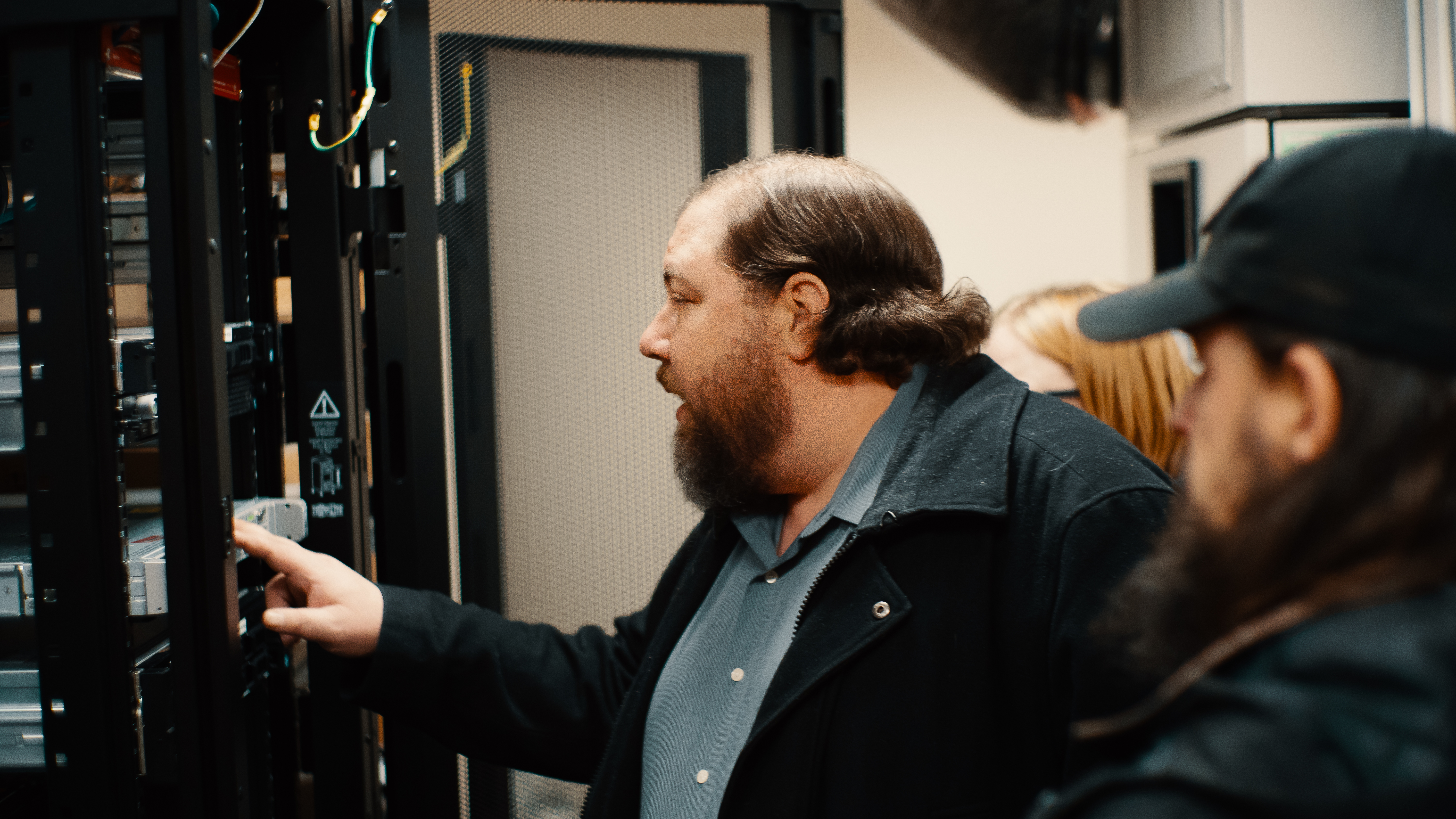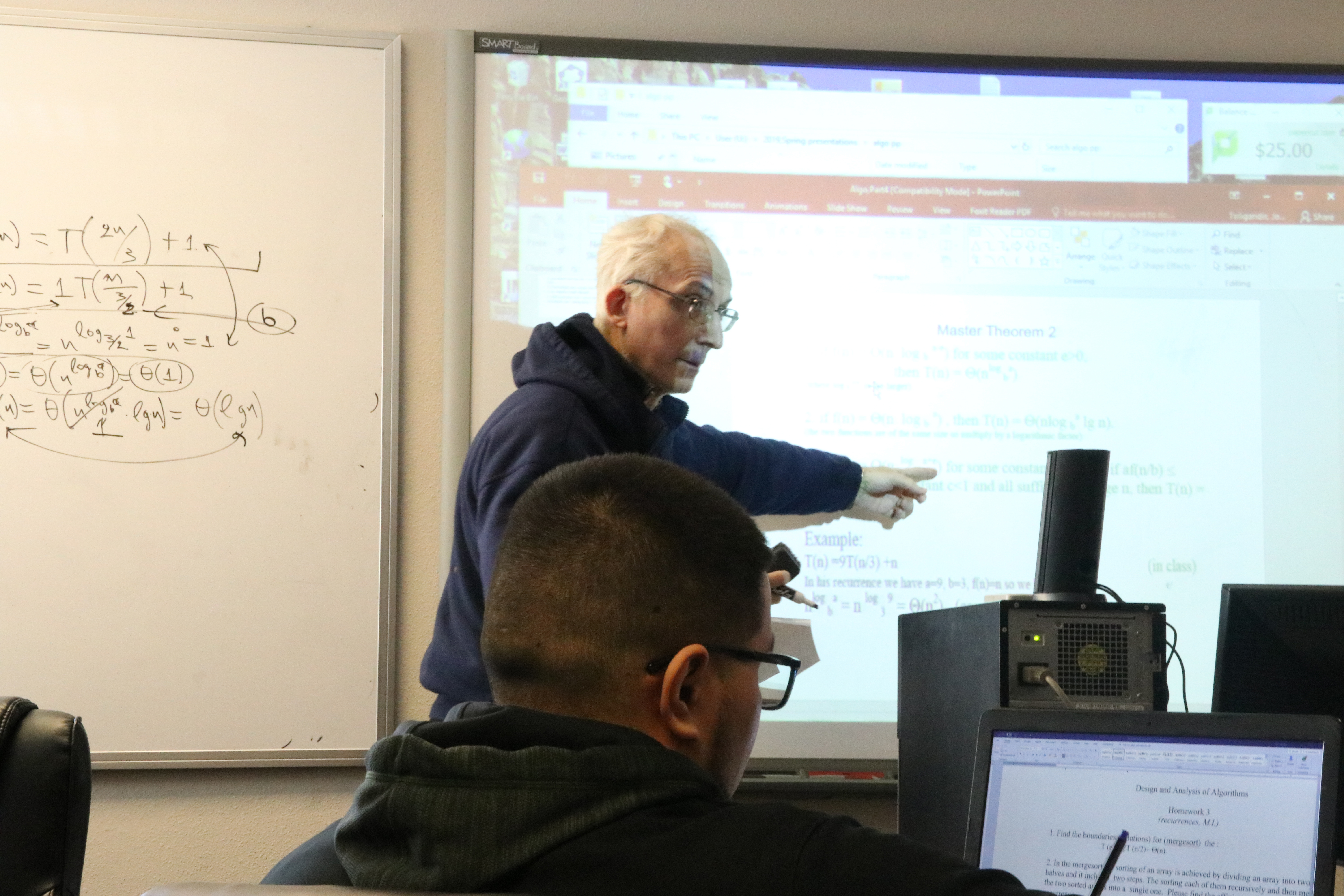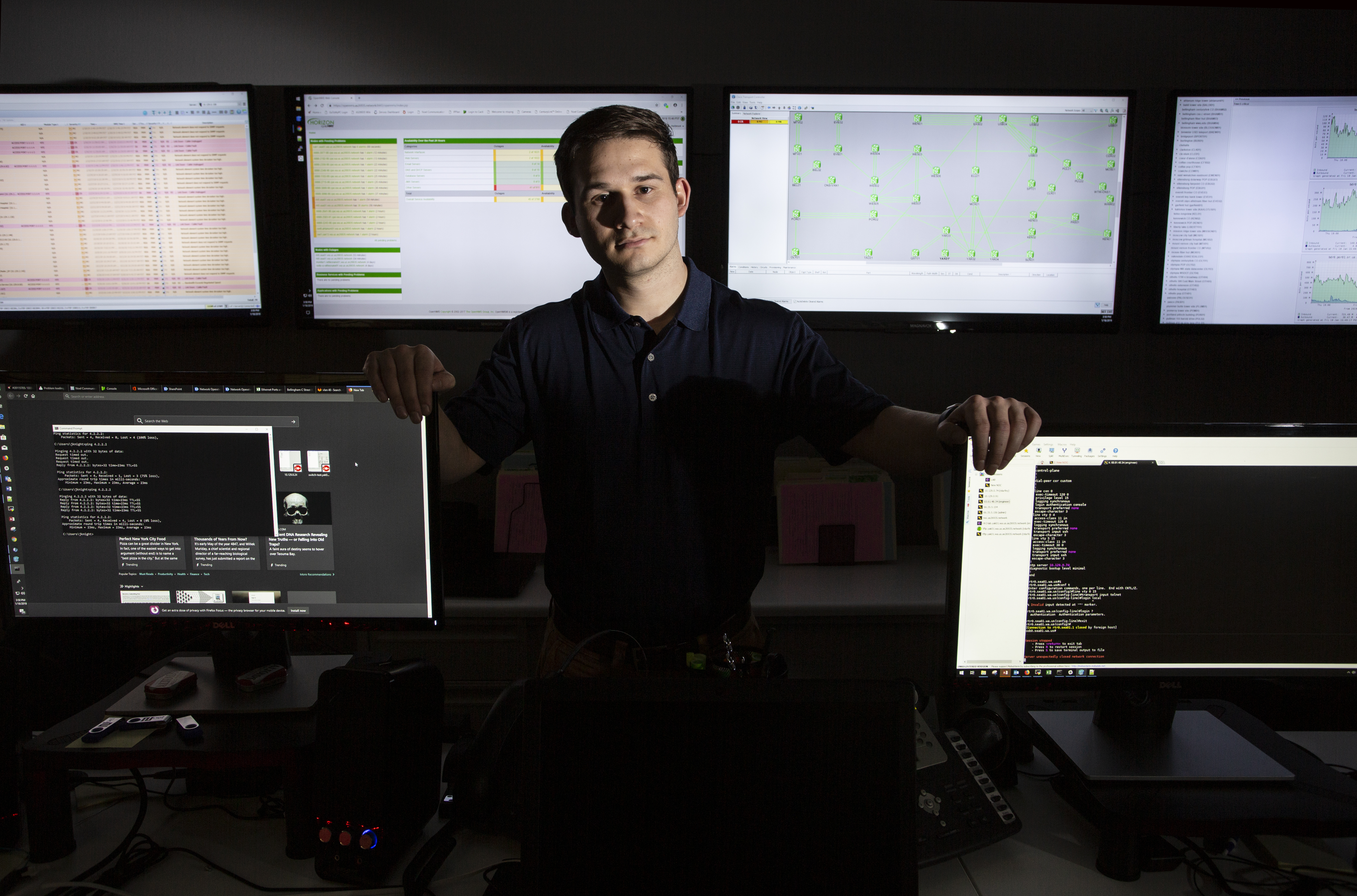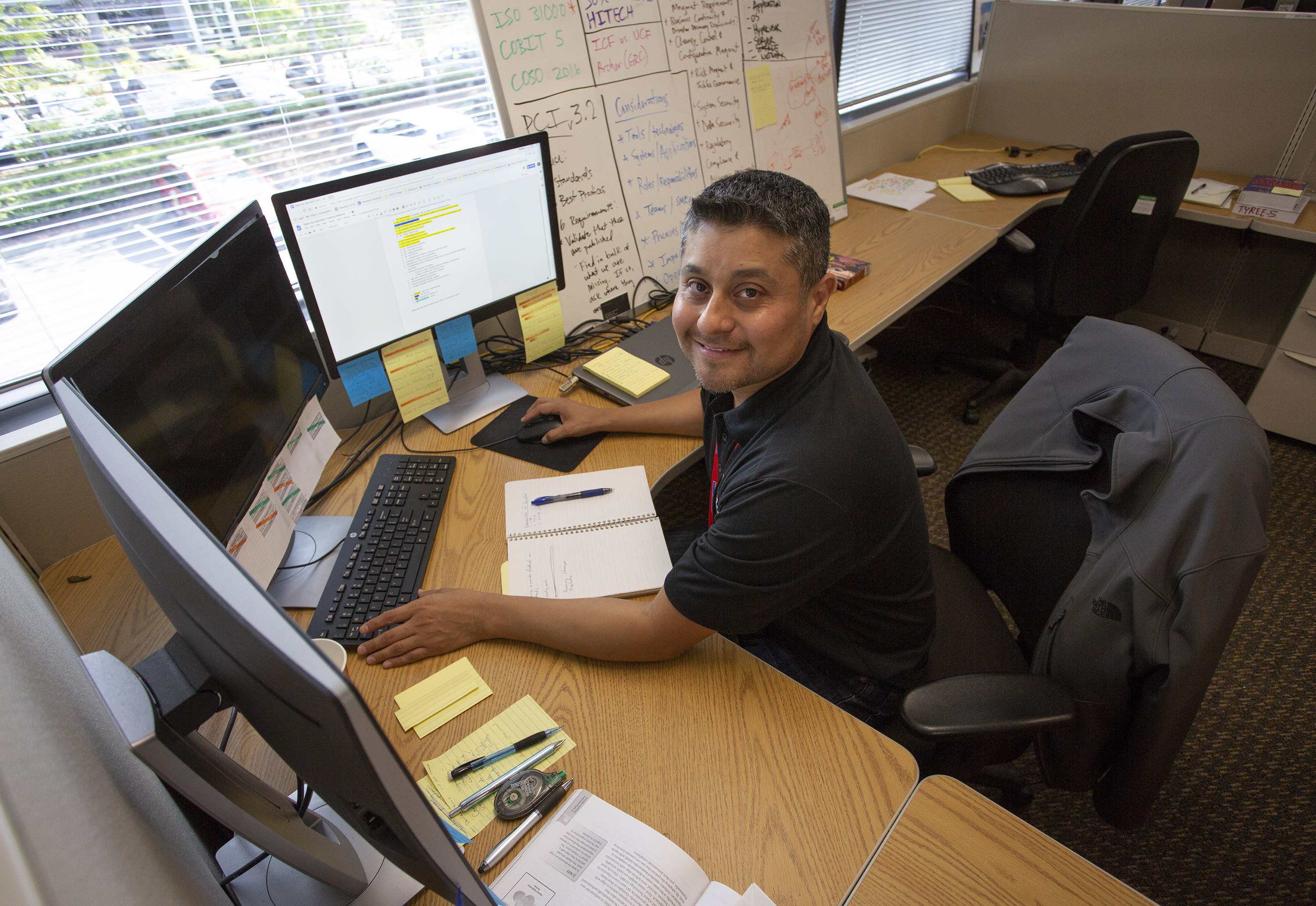Geeking Out Over Tech

Samuel Small (B.S., Computer Science, 2013) is the Director of Information Technology and a computer science instructor at Centralia College. He is completing his master’s degree from Georgia Institute of Technology and is looking into Ph.D. programs.
Heritage’s computer science program is challenging, rigorous – and tailored for the success of each student.
Small but mighty— That’s how people who know it like to describe Heritage’s Computer Science program.
Though a relatively small number of students graduate from the program each year, they leave Heritage well educated in their subject matter, confident in their abilities, and often having studied highly specialized curriculum developed specifically in response to what’s needed by employers.
Having earned their Bachelor of Science degree in Computer Science or Bachelor of Arts in Information Technology, most of Heritage’s computer science majors go right to work – as computer programmers, security specialists, systems analysts, database administrators, web administrators, software engineers and network administrators.
Some 15 to 20 percent go on to pursue graduate studies. HU computer science grads have gone on to some of the most prestigious graduate schools in the United States, including Loyola University, the University of Chicago and the University of Washington.
How does this small department achieve such big results?
A rigorous curriculum taught by outstanding faculty, a low teacher-to-student ratio, and a commitment to making real- world experience a part of each student’s education make all the difference.
STUDENT-TO-PROFESSOR RATIO
A student majoring in Computer Science at Heritage must be ready for an academic challenge. Required courses for the degree include Algorithms and Data Structures, Computational Complexity, Design and Construction of Large Software Systems and Computer Architecture. Non-computer science requirements include a full calculus sequence, math, algebra, statistics, physics and English.
It was precisely that kind of challenging curriculum that 2013 HU graduate Samuel Small sought.
Small started working on computers as a teen. He knew them inside and out, but he also knew he needed a formal education to have a career in computer science.
Small looked at a number of schools that offered the Bachelor of Science degree he needed, including Heritage. “Heritage’s program was similar to the major state schools – same requirements for your degree, same basic class structure,” said Small. “I wanted local – that was really important to me. And when I talked with Richard (Swearingen), I understood that if I went there, I wouldn’t be missing out on anything just because it was a small school.”

Dr. John Tsiligaridis leads a lecture on the design and analysis of algorithms in one of his upper-level courses.
PERSONALIZED ATTENTION
He not only didn’t miss out in terms of classes, he gained from close relationships with his professors, especially John Tsiligaridis, Ph.D., who teaches computer science, and Swearingen, who teaches math and chairs the Department of Math and Computer Science.
“Our cohort was four students, and I had five professors in all my time at Heritage. I really liked that,” said Small.
A constant for Small throughout his studies at Heritage was Tsiligaridis, who taught all of his computer science courses.
Tsiligaridis’s most recent Ph.D. is in Computer Science Engineering from the State University of New York at Buffalo. He also holds a Ph.D. in Computer Networks from National Technical University in Athens, Greece., as well as a Master of Science in OR and Informatics, a Master of Philosophy in Data Mining and two bachelor’s degrees.
Tsiligaridis – “John” to his students – is known for the personal and caring relationships he builds with each of them. Tsiligaridis worked with Small where he needed it, knowing he had more computer knowledge than his fellow students.
“Because I knew a lot of the content already, the time John and I spent together was focused on him mentoring me on the more challenging work,” he said. “John really cares about all his students. It was a huge plus of the Heritage experience.”
STAYING AHEAD OF THE CURVE
When your department is small, it can be nimble, said Swearingen, and that’s much to the benefit of the Heritage computer science major.
“The computer science realm evolves rapidly, and so staying ahead of the curve is important. Our size allows us to be responsive to change in the world of computer science and adjust our curriculum to make sure our students get to work on what is most relevant.”
Tsiligaridis maintains close working relationships with people in business in the Yakima Valley and beyond, so he’s continually aware of what’s needed today that may not have been a thing yesterday.
“John is particularly adept at anticipating changes in computer science and what’s going to be cutting edge. He’s very aggressive about identifying what we need to do to. If he catches wind that there’s a skill set a business might want from our graduates, he’ll develop a special course that targets that skill and gets students working in those classes,” said Swearingen.
INVALUABLE INTERNSHIPS

Heritage University computer science graduate Eliseo Alcala works at Noel Communications Jan. 18, 2019 in Yakima, Wash. (GORDON KING/Gordon King Photography)
Besides in-class time, a significant portion of Small’s education at Heritage was outside the classroom in an internship designed just for him.
Small worked with Heritage founder Dr. Kathleen Ross for two years researching a process for archiving documents for the Institute for Student Identity and Success.
Internships offer Heritage students meaningful opportunities to apply what they’ve learned in class, explore their particular interests, and develop new strengths and understanding of real-world environments (see “Conferencing In” on page 8).
Tsiligaridis happily cited a few of the students he’s helped into internships.
“Jesus Mendez, who graduated last year, did work at the Pacific Northwest National Laboratory in Richland. Ermenejildo Rodriguez interned at Coastal Margin Observation and Prediction, then got a computer programming job at Costco headquarters in Seattle. Jeremiah Schmidt did an internship at IGERT Ecosystem Informatics and is now doing meaningful work in his community at the Yakima Valley Farm Workers Clinic.”
Like Mendez, Rodriguez and Schmidt, every computer science major at Heritage will have had at least one internship before he or she graduates.
“I am very happy to see that our program is known and well respected in the Yakima Valley area,” said Tsiligaridis. “We see our students continuing to thrive.”

Heritage University graduates Meadow Rodriguez and Gerardo Ruelas photographed where they work at the Costco corporate headquarters in Issaquah, Wash. Sept. 19, 2018. (GORDON KING/Gordon King Photography)
MAKING MEANINGFUL CHANGE
Now director of the Information Technology Department at Centralia College where he also teaches computer science courses, Small said his Heritage education was solid – and that his degree was not the only thing he took with him when he graduated.
“My students are almost all low income. Because of my experience at Heritage, I see my job as empowering them.”
Small focuses on personally connecting with students to help them like his mentors at Heritage helped him.
“I see myself in the future working at the state level to support technology, using technology to drive change from within,” said Small, who’s about to earn his master’s degree from Georgia Tech with plans for pursuing his Ph.D. after that.
“The further up I can get in the hierarchy, the more I can drive the decision-making.
“My professors, and really everyone who makes Heritage what it is, showed me that, given the right curriculum and the right support, we can all succeed.”
The Computer Science program at Heritage University focuses on the theory and techniques by which information is encoded, stored, communicated, transformed and analyzed. The program concentrates on the theory of algorithms – which, simply put, are procedures that tell your computer what steps to take to solve a problem or reach a goal – the structure of languages for expression of algorithms, and the design of efficient algorithms for the solution of practical problems. Extra emphasis is placed on the study of everyday computer systems hardware and programs.

